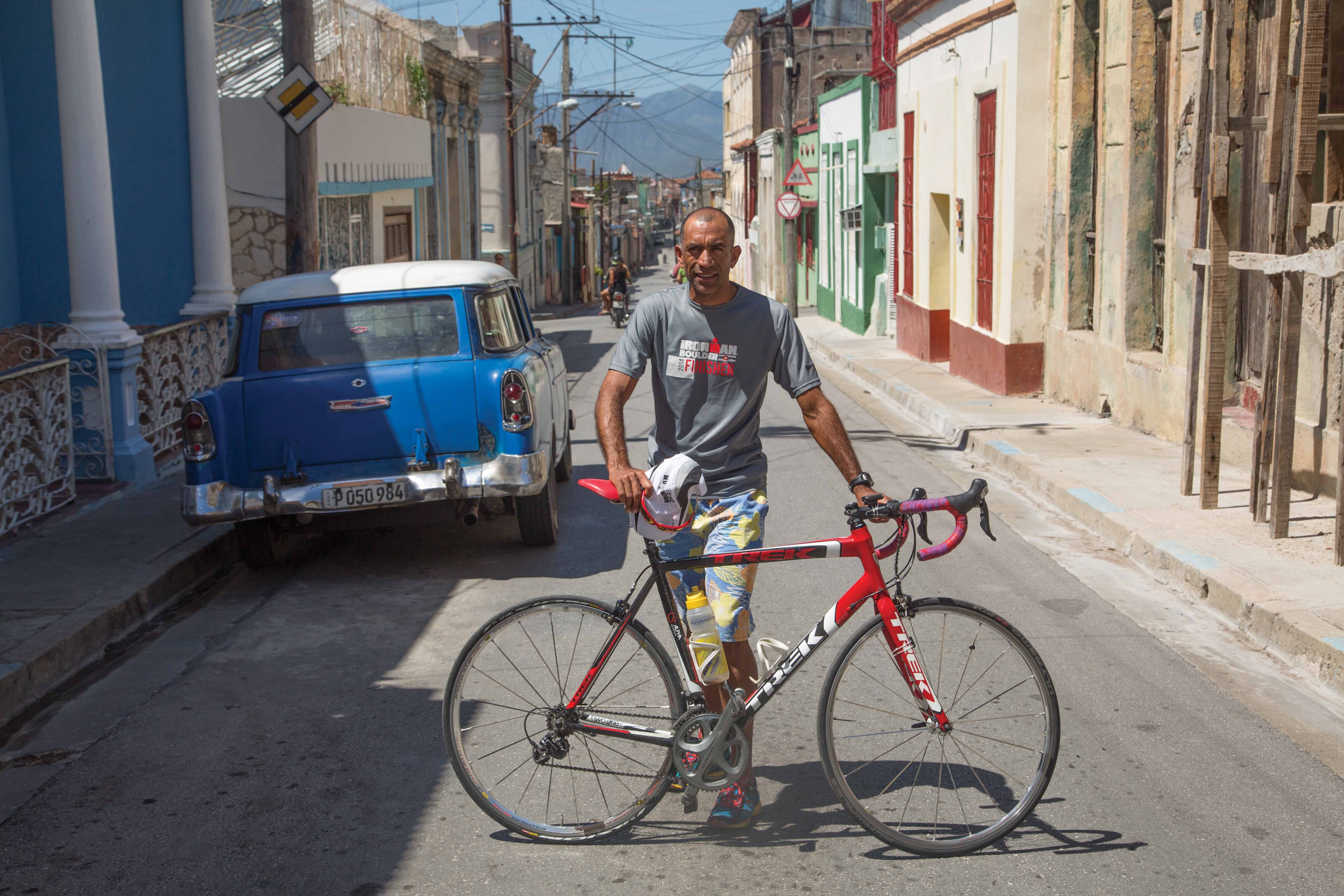This Cuban Triathlete Is Clearing The Way For Others

Photo: Steve Godwin
Cuban triathlete Raul Alcolea finds a way to live out his multisport dreams—and clears the way for other aspiring athletes.
Raul Alcolea hits rewind on his VCR and plays the tape once more: Mark Allen crossing the finish line of the Ironman World Championships in 1995; Thomas Hellriegel taking top honors in 1997; Luc Van Lierde’s win in 1999.
“The images are so touching,” Alcolea says, gasping at another image on the screen. “Look! Crawling to arrive at the finish line!”
This is the video that changed Alcolea’s life. The day after watching highlight clips of the Ironman World Championship, he decided he was going to become an Ironman as well. Nothing would stop him—except for the Cuban government.
The Caribbean island didn’t offer much in the way of triathlon events, and government officials denied Alcolea’s request to travel outside of the country to participate an Ironman triathlon.
“But my motivation was huge,” he recalls. One year later, on Christmas Eve 2004, Alcolea—using a rope to measure the swim course, a steel bike, and an extremely weathered pair of running shoes—became a de facto Ironman in Santiago de Cuba. His finish time was 11 hours, 9 minutes and 16 seconds. There was little fanfare at the finish line of his self-made Ironman, but the experience was still the best moment of Alcolea’s life.
“I kept training because maybe someday I could participate in a real Ironman,” says Alcolea.
Meanwhile in Canada, Shelly Laflin got wind of Alcolea’s efforts. As a 10-time Ironman finisher, Laflin felt an immediate kinship with the Cuban and wanted to help a fellow triathlete achieve his dreams. Some of Laflin’s American friends, similarly inspired, had gathered triathlon gear to donate to Alcolea, but the USA’s trade embargo on Cuba made delivery problematic.
“The shipping cost and complications of getting to Cuba from the USA were very complicated,” says Laflin. “Since I was from Canada and could easily go there, they asked if I would be interested in taking a bike and other donated items to Raul. How could I not help?”
Laflin flew to Cuba with a new bike, new and used clothing, tubes, tires, swim goggles, shoes, and copies of triathlon magazines. Meeting Alcolea was an eye-opening experience for Laflin, who recalls being struck by just how limited the resources were for Cuban triathletes:
“They have very, very little, and what they do have they cherish and appreciate like gold. Raul showed me a man’s razor. He was holding onto it like it was precious, as he said it was his one and only and had to make it last close to a year.” Needless to say, Laflin’s haul was life-changing for the working-class athlete.
Since that first meeting almost 10 years ago, Laflin and Alcolea have maintained a close friendship built on triathlon. In 2009, Laflin filed paperwork to sponsor travel for Alcolea to compete in Ironman Canada, but the request was once again denied by the Cuban government. During their frequent phone calls, Laflin tells Alcolea stories about her most recent Ironman races, and Alcolea shares tales of training and racing in Cuba.
The two remain optimistic Alcolea will one day achieve his dream of racing a sanctioned Ironman event. Recent developments in diplomatic relations between the United States and Cuba gives Alcolea hope his travel requests will be approved soon. In the meantime, Alcolea trains every day on gear provided by his Canadian friend.
RELATED PHOTOS: American Athletes Report Back on Racing in Cuba
Paying It Forward
Because triathlon changed his life for the better, Alcolea now works with nonprofit organization One World Running to put running shoes on the feet of Cuba’s emerging athletes.
“There are many challenges in getting shoes to the Cuban runners and triathletes,” says Mike Sandrock, founder of One World Running. “We cannot just load up a cargo container or a load a truck and drive the shoes, as we do for other areas we serve.”
Instead, Sandrock recruits volunteers to travel as a group to Cuba for service trips to help runners. Volunteers use their baggage allowance (44 pounds) almost entirely for donated running shoes. Once on the island, Alcolea helps Sandrock identify aspiring runners and triathletes in need of gear.
“He helps ensure that those who need the equipment benefit,” says Sandrock. “I remember one time, we came to Cuba with some new gear. After everything was distributed to a group of young runners and triathletes, I took an easy run with Raul. I looked down and saw that he had a worn pair of Newtons on that we had given him the year before. ‘Raul, where are your new shoes?’ I asked. ‘I gave them to another athlete who needed them,’ he said.”